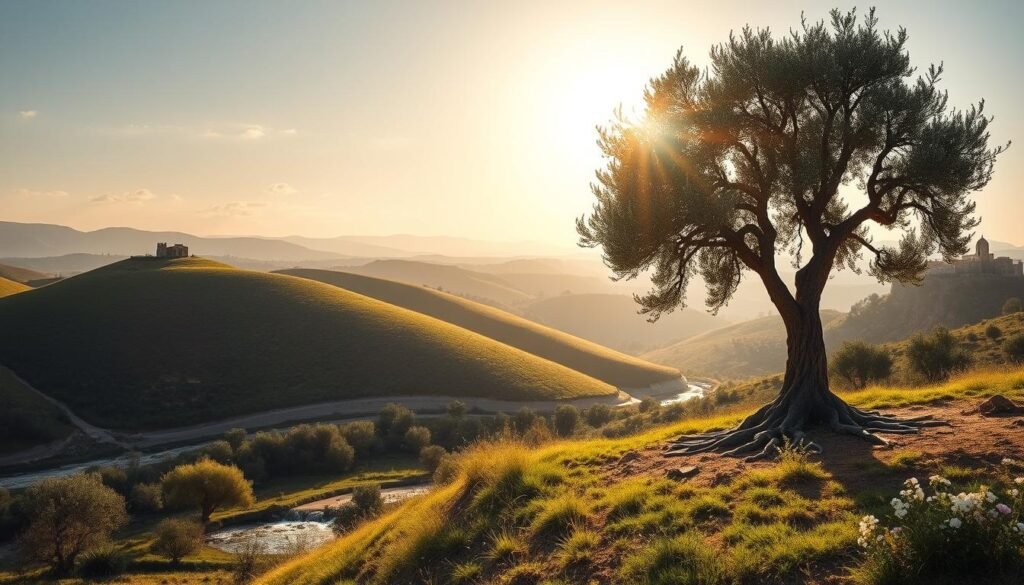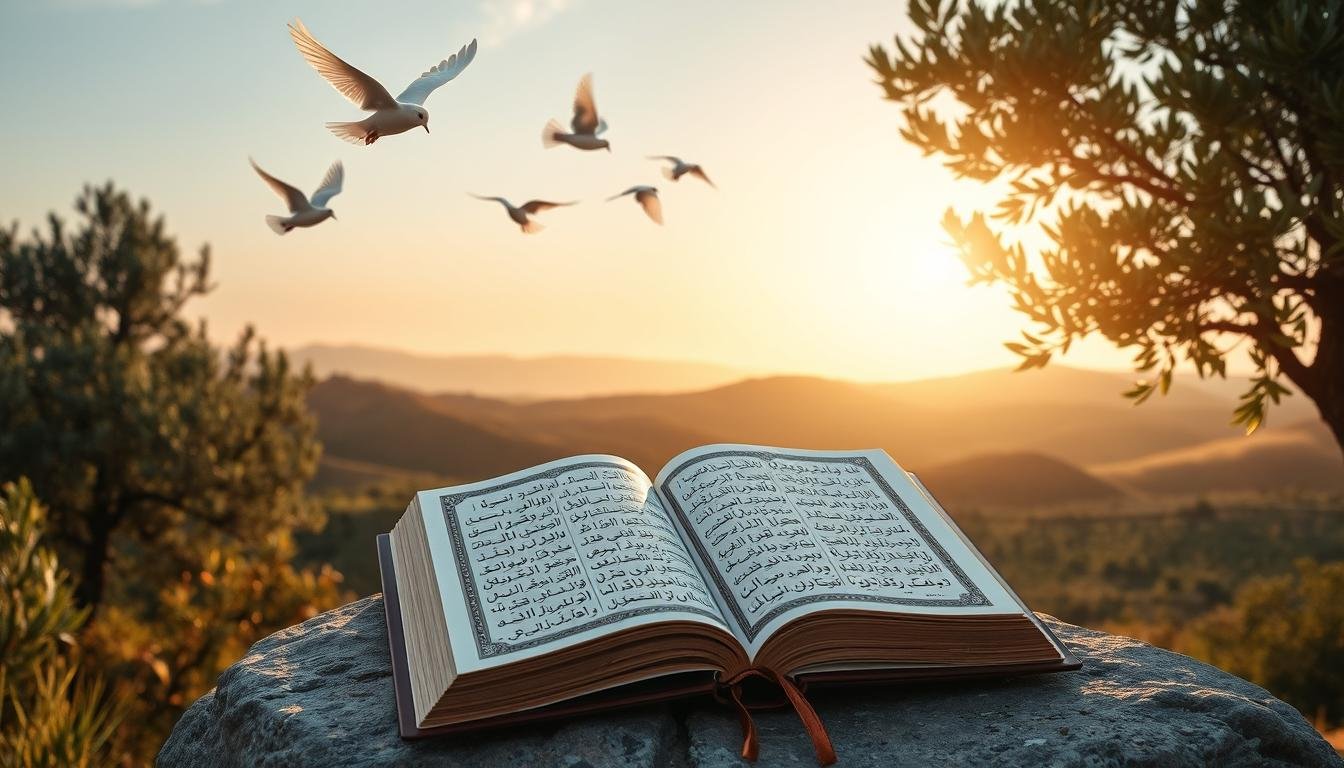What if the key to understanding Palestine’s rightful place in history lies within the sacred verses of the Quran? What Does The Quran Say About Palestine Being Free? As geopolitical tensions rise, many seek clarity on the Islamic view of Palestine’s freedom and ownership. This section will explore how the Quran views land ownership, historical grievances, and divine promises. It will show the deep spiritual and historical bond Muslims have with Palestine.
For centuries, the Quran’s teachings on freedom have been deeply meaningful. Will these teachings guide future generations in their quest for justice in the region? Let’s dive into this by analyzing Quranic verses and interpretations.
The Concept of Freedom in the Quran
Quranic freedom means more than just personal rights. It also talks about justice and fighting against oppression. The Quran says every human being is dignified. It teaches that true freedom needs justice to exist.
Islamic teachings stress protecting the rights of people and groups. They also talk about the duties that come with freedom.
Palestinians face big challenges today, showing the Quran’s important messages. They’ve lost land for about seventy years and face harsh conditions. They’re also blocked from visiting Islam’s third holiest place, Masjid al-Aqsa.
In Islam, freedom lets people enjoy their rights, like the right to practice their faith. The Quran says people shouldn’t be forced to change their beliefs. It also values religious diversity.
Dr. Muqtedar Khan says Muslims need freedom to follow their spiritual paths. This idea comes from Quranic verses that support religious freedom and diversity.
The conflict in Palestine makes us think about leadership and Palestinian rights. People want a say in how they are governed. This is key to fighting for justice and ending oppression.
The story of the Battle of Badr shows the importance of standing up against persecution. It’s a lesson for today’s fight against injustice and for dignity.
Understanding Palestine’s Historical Context
Palestine’s history is filled with different eras of rule, cultural changes, and religious importance. Knowing this history helps us understand today’s conflicts and what the people of Palestine hope for. The land has seen a lot of Islamic rule, which has shaped its culture and faith.
Early Islamic conquests and the Crusades changed the region a lot. Each change affected how people were ruled and their beliefs. These events show how deep the fight for control has been in Palestine’s past.
In the late 20th century, groups like Hamas changed things again. They brought a strong Islamic view to the fight. This mix of local and global politics made the struggle for Palestine even more complex. It shows how Islam and politics can combine to create a story of resistance and the desire for freedom.
What Does The Quran Say About Palestine Being Free
The Quran teaches us a lot about land ownership and freedom in Palestine. It says that being a good caretaker of the land is very important. The Quran also talks about a promise of inheritance for those who are just and righteous.
Islamic scholars give their own views on certain Quran verses. They help us understand how these verses might apply to Palestine’s future.
Key Verses Related to Land Ownership
Many Quran verses talk about land ownership and the duties that come with it. They say that *the land belongs to Allah*. This means that true ownership is about being a good steward of the land.
For example, Surah Al-Anbiya (21:106) talks about the promise of the land going to righteous people. This shows the deep connection Muslims have with the land of Palestine. It also gives hope for a better future for those who truly belong there.
Interpretations by Islamic Scholars
Islamic scholars have different views on what the Quran says about land ownership. They believe that facing challenges doesn’t mean you lose your right to the land. Instead, these challenges test your faith, and staying strong is key.
These scholars say that enduring hard times strengthens your spiritual bond with the land. The Quran gives comfort and guidance during tough times. It also teaches how to bring back justice. They believe that faith and staying strong are crucial for the rightful return of Palestine to its true owners.

Prophetic References to Palestine’s Future
Islamic prophecies about Palestine’s future bring hope and insight. They offer a glimpse into what lies ahead for those who care deeply about the region’s peace. These prophecies speak of justice and restoration for the land, which has seen many hard times.
Some Hadith, or sayings of the Prophet Muhammad, hint at big changes for Palestine. They suggest a future where the rightful people take back their land. This will lead to peace and cooperation among different groups. These prophecies give strength to those fighting for freedom in Palestine.
Today’s events make these prophecies more relevant than ever. With ongoing tensions and disputes over land, many turn to Islamic teachings for direction. These prophecies remind us that hope never fades, even when things seem bleak. They encourage people to keep working towards a better future in Palestine.
The Role of the Righteous in Inheriting the Land
In Surah Al-Anbiya, we learn that the land goes to those who are truly devoted to God. It’s not just about who you are or how strong you are. It’s about being faithful and morally upright. This shows us that being righteous is key to getting the land.
People who follow God’s teachings are seen as the true owners of the land. This idea is very important in Islamic tradition.
Discussion on Surah Al-Anbiya’ Verses
Verses 105-106 of Surah Al-Anbiya say the land goes to the righteous. This idea is also found in other Islamic teachings. It says the true owners of the land are those who are spiritually worthy.
The Quran calls the land “Holy,” showing it’s very special. This makes us understand that getting this land is only for those who are deeply committed to being good.
Comparative Analysis with Biblical Texts
Surah Al-Anbiya shares similar ideas with Biblical prophecies about the land. For example, the stories of the Israelites in the Bible talk about losing and getting the land back based on how they followed God’s rules. Both the Quran and the Bible link being morally good with getting the land.
This shows that being good is a shared responsibility across faiths. The land’s holiness shows how important it is to live ethically. This is how we show our love for God and get His favor.
Quranic Guidance During Trials and Tests
The Quran gives deep insights on how to handle life’s tough times. It talks about the struggles of people like those in Palestine. It says patience is key during hard times. Tests of faith are chances to grow spiritually and become stronger.
In Surah Al-Baqarah, verse 155, it says,
“And We will surely test you with something of fear and hunger and a loss of wealth and lives and fruits, but give good tidings to the patient.”
This verse tells us that going through trials brings us closer to Allah. It reminds us that sticking with it is worth it. The Quran tells us that God is always with us, giving us strength when we feel weak.
Many Muslims look to these teachings for strength during hard times. Relying on God and following the Quran helps us stay strong and hopeful. This message helps those going through tough times, showing how important it is to keep going.

Patience and Resilience: Themes in the Quran
In the Quran, patience and resilience are key to faith, especially when facing hard times. Communities in Gaza, dealing with harassment and violence, find strength in these Quranic themes. The story of the Battle of Badr shows how belief strengthens the spirit, even when the odds are against us.
The tale of the cave youth shows Allah’s promise to support believers. Their story teaches us that faith keeps hope alive, even in tough times. Moses’ mother’s story also highlights Allah’s support in overcoming challenges, showing us the power of resilience.
In Gaza, a blockade limits access to basic needs, and many have lost their lives. Yet, the people’s resilience reflects the Quran’s teachings. Zareena Grewal notes that after 9/11, many turned to the Quran to understand its teachings on resilience and faith.
Even in chaos, faith helps people keep going. The Quran’s promise of support keeps hope alive, encouraging them to believe in a better future. For more on this, check out faith and resilience in the lives of Palestinians.
The Islamic Perspective on Justice and Oppression
The Quran teaches us a lot about justice and fighting against oppression. It’s not just about laws; it’s also about our moral duties to each other. The Quran says justice is sacred. It tells Muslims to stand up for fairness and dignity, even when it’s hard.
This is very important today, especially for the Palestinian people. They face many challenges and injustices.
Relevance of Current Events in the Quranic Context
Today, we see a lot of injustice, and the Quran’s view on oppression is more important than ever. Allah’s laws tell believers to help those being treated unfairly. A story from Ṣaḥīḥ Muslim shows us our duty to protect the weak and fight against wrongs.
This idea matches the idea that true worship means freeing the oppressed, as said in stories about the Prophet.
In Gaza, 50% of the people are children, which makes the need for justice even more urgent. The Palestinians have been fighting for their rights for over 75 years. They’re not just fighting for land; they’re fighting for their dignity, as the Quran teaches.
Oppression is a global issue. For instance, some people find joy in others’ suffering, like during the 2014 Gaza bombing. But the Quran says this is wrong. It warns that those who take others’ land unfairly will face severe punishment on Judgment Day.
These teachings are very important for us today. They tell us we must fight against injustice. This is what the Quran teaches us. It gives us a way to help those who are being treated unfairly.
We must all commit to making justice win over oppression. This is what the Quran asks of us.
You may also be interested in:
The Role of Muslims in the Liberation of Palestine
The fight for Palestinian freedom needs a strong Muslim responsibility that goes beyond borders. Since 1988, Hamas has stood for resistance against the occupation and backing the Palestinian struggle. Their Covenant shows a deep commitment, rooted in the Quran, especially Surah Al-Imran.
Muslims everywhere should stand together in solidarity. The Quran calls for justice and helping the oppressed. It says everyone has a part to play in fighting for those who are wronged. This unity helps Palestinians stay strong and reminds Muslims of their duty to fight against wrong.
Supporting Palestine is more than just cheering them on. It means getting involved in efforts to educate and help Palestinians. By raising awareness, Muslims can get the world to care more about justice and Palestinian rights. The Covenant says fighting against oppression is key to freeing Palestine, which is a big part of the global fight for human rights.
Quranic Prophecies About Palestine
Quranic prophecies are key to understanding Palestine’s future. Surah Al-Isra gives believers insights into the deep connection between the land and its people. These prophecies suggest that the righteous may reclaim their rights and bring justice, offering hope to those who believe.
Explanation of Relevant Verses from Surah Al-Isra
In Surah Al-Isra, verses talk about the Children of Israel’s duties and past wrongdoings. They broke promises and ignored divine signs. The Quran also tells of Maryam’s accusations and the unjust killing of prophets, showing a story of accountability.
It also tells of `Isa’s miraculous rise into the heavens, proving he wasn’t killed. This shows another person was wrongly crucified in his place.
The Quran hints at a future where the People of the Scripture will unite, believing in `Isa before he leaves the world. This connects to Palestine’s current situation, telling a story of suffering and victory.
Surah Al-Isra also talks about signs before the Hour comes, like social chaos and strange events. These signs make us think about Palestine’s future and the urgency of the situation. Muslims see a promise of peace and justice in these prophecies.
Global Awareness and Support for Palestine
The crisis in Palestine has sparked global awareness and support. People worldwide are coming together, showing solidarity with the Palestinian cause. They call for international action against injustice.
This movement highlights the need to support Palestinians. It fights against fear and false information that shapes public opinion. It’s important to hear the stories of Palestinians, especially the innocent ones suffering.
Foreign governments, especially in the West, are being watched closely. They are seen as not fully understanding Palestinian resistance. This view links it to Islamic extremism, trying to make people see Palestinian rights as supporting terrorism.
This is a big issue because it stops people from feeling for the Palestinians. It’s key to tell the truth about the innocent Palestinians, especially the women and children hurt in conflicts.
Social media is changing how we support Palestine. It lets people share stories that might not be told otherwise. Videos show the human side of the conflict, touching hearts worldwide.
Not all countries react the same way to the crisis. Some, like Spain and Ireland, stand with Palestine, showing they understand the issue’s complexity. It’s vital to keep pushing for justice, using moral and Islamic values. This helps keep the world’s focus on supporting Palestine.
FAQ
What Does The Quran Say About Palestine Being Free
How does the Quran define justice and oppression?
What historical events have shaped Palestine’s current situation?
Are there specific Quranic verses about land ownership in relation to Palestine?
How do Islamic scholars interpret Quranic verses related to land?
What prophetic references exist regarding Palestine’s future?
How does Surah Al-Anbiya’ discuss the inheritance of the land?
What guidance does the Quran provide during difficult times?
How do themes of patience and resilience appear in the Quran?
What is the Islamic perspective on justice and current events in Palestine?
What responsibilities do Muslims have regarding the liberation of Palestine?
What Quranic prophecies specifically relate to Palestine?
How is global awareness and support for Palestine currently being expressed?

Embracing Faith, One Insight at a Time!
The teachings of the Quran have always guided my path. With a deep passion for Islamic knowledge, I strive to blend the wisdom of tradition with the relevance of today, making the timeless messages of Islam accessible and meaningful for everyone.
Muslim Culture Hub is my platform to share historical insights and thought-provoking articles, exploring both well-known and lesser-discussed aspects of Islamic culture and beliefs. My mission is to create an inclusive online space where everyone can learn, strengthen their faith, and connect with the profound message of Islam.
Join the journey!
May peace be upon you.








